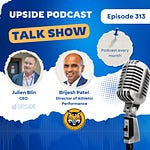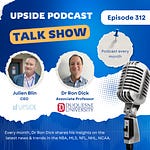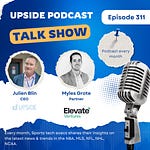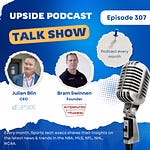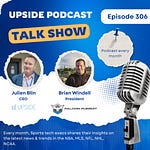This week, we have the honor to interview Tal Brown, CEO of Zone7, the Human uptime company.
Zone7’s mission is to harness the power of AI to help sporting organizations better achieve their goals through the enablement of greater health and longevity. Their suite of services includes human performance data services, player resiliency reporting, schedule and travel optimizations, long-term injury risk and explainability reporting and an AI-powered injury risk forecasting platform for leagues and teams. Data is collected from wearables, medical profiles and physio & screening products to ensure the utmost accuracy and trust.
Here is a video explaining how the technology works:
Zone7 partners with stakeholders across sports. They are deployed in professional and collegiate sporting environments. Select clients include Liverpool FC, Napoli, LAFC (MLS) and more.
📝Show Notes: Through this interview, we touched on his background, his company and product, the benefits for sports organizations and athletes to use his product. We also talked about his competitive advantage, business model and plans for the next 12 months.
Best Quotes: Here’s some of the key discussion points and best quotes from our conversation with Tal:
On his background:
“So my background is actually in the data science universe. I spent about 15 years building data science and data engineering platforms in other industries such as cybersecurity and enterprise software. And I worked both on the technical and product side, basically how the predictive models interact with humans who need to make decisions. So that’s where I come from”.
“My last job before this was with Salesforce, where I worked on their AI platform. And then about five years ago, I founded Zone7, which was for me a new domain”.
On how he got the idea of launching Zone7:
“I look at the universe through the data prism, where I basically asked myself: Is there a really interesting, difficult problem to try to attack? Are there relevant inputs? And how would the model get used in reality? Some AI tools are kind of automated AI outputs that get used by other algorithms”.
“You're using AI to determine whether to buy or sell stocks, or how much money a ticket should cost on a given game day. For me, what I really liked about this universe of performance and injury forecasting and load management is that there's a human expert. And the expert will continue to be the center point. But the question I'd like to ask is, can AI and algorithms help make that process more efficient and more robust?”.
“So the aha moment for me was when I looked around and said to myself, wow, these humans represent a very big financial investment when they come into the sporting organization. And any marginal gain that you can provide, and we can use the term uptime, or we can use the term availability. Every marginal gain is such a big difference maker. And that was my moment. I was like, okay, this is a really interesting problem. It's really hard to solve from a data perspective. And the impact is big to help reduce the downtime of athletes”.
On his team at Zone7 who have backgrounds in data science and the world of football:
“We're an international company. We've got folks in America, in the United Kingdom, and in Israel. Most of the employees are experts in data science and data engineering, and people who know how to create predictive models and who have done so in other industries”.
“And then we also have a team of of people who interface or interact with our clients, typically people from those industries as well. So we have some people in our team who come from the world of football. So to summarize in our team we have people with mixed backgrounds. And we're about 25 people today. And we've got clients all over the world in north America, the UK, and Europe”.
On how the Zone7 platform works, the workflows it supports and the 3 types of algorithms it can create for teams:
“So the idea behind Zone7 is that there are three main workflows in the day-to-day lives of performance operators. I'll use that term generally to say performance directors, strength and conditioning, sport science. And one of the workflows is to triage risk and understand out of the roster who can go hundred percent and who needs some kind of change”.
“The second workflow is about investigation. Think of it as a forensic analysis. Hey, why is there a red flag here? What happened? Is it biomechanics? Is it sprinting? Is it too much of something? Or maybe it's too little of something else”.
“And the third thing is, what do you do about it? How does this risk and context influence what we do today? So these are the three main algorithms that we create. There's one for risk forecasting. There is one for contextualizing and explaining that risk. And then there is another one for creating options for interventions. The operating premise for us is that people do this job and they will continue to do this job and we're not going to replace them”.
On how the Zone7 platform is being used on top of the data and tools (sensors, AMS platforms..) that they use:
“So we have products that are used by teams on top of the existing tools they have, and the sensors for movement and biomechanics they use, and then sometimes on top of the databases and AMS platforms they use”.
“We see ourselves as a layer that is complimentary, not competitive with those tools / data (GPS, force plates..). We're not an AMS platform, but we focus entirely on the AI. So if you have data, as a team, and if you have a desire to apply advanced algorithms to that data, creating these algorithms is really hard. Now teams create algorithms for, let's say, scouting and for talent identification. But for the universe of injury forecasting, load management, it's very, very difficult”.
“So there's a lot of data coming in every organization, with the problem of saving, storing, and managing that data. So some of them will use an AMS, some of them will use spreadsheets, some of them will use an internal system that could be built on some BI tools, for example”.
“You can to data providers and access data about games, but you cannot purchase data about what happens in the gym or training. So you end up with a limited data lake. So we see ourselves as a third complementary value add on top of the layer one data sources, layer two, and let's say database tools. And we focus entirely on AI. We're not trying to do anything else. So we're complimentary to those other platforms like AMS platforms that the team use, and we help teams compile the data and make sense of it via AI”.
On how Zone7 helps teams improve their processes:
“We help teams do these processes very efficiently. And I would say in some cases, we help them do it more accurately by using an algorithm, learning from a very large dataset, and all the data that we have analyzed in a sports like football, and we can help them create accurate insights around these three things: risk triage, and explaining why and what are the options for intervention”.
On how Zone7 is being used by teams on a daily basis:
“So in the universe of teams, this is used by teams on a day-to-day basis to plan the next day, to plan the next few weeks, and in informed suggestions such as recovery protocols or training protocols. And we also have some tools that are used by larger stakeholders such as leagues that help to inform them on long-term strategies, whether it's travel or risk management or whatever that is”.
On their process when engaging with a team for the first time around their data and their ability to enable data continuity if there is a data gap:
“So the first thing we do is we show a client the validation project based on their data. And that helps to build trust in the accuracy. Now we also know their system, if the team has some gaps in their data. One of the things when you create this approach, a data lake approach, is that the reality is complex, right? Sometimes it's complex because of the sport itself. Rugby players are going to play somewhere else for international breaks and come back. Or some football players are going to play for their national team, and they come back”.
“So you either have gaps in your data or you have data from different sources, or something breaks down, right? Or somebody decides to skip a week on a force play jump. So you need to deal with these scenarios. From a data perspective, for us, it's not okay to turn off the AI for a few weeks because the AI needs to be working”.
“So we had to find ways to create data continuity. And we do that. So for example, in football or soccer, when folks go to international tournaments, we can integrate that data automatically, or when a team switches GPS providers, we can create continuity for them. This was part of what we do because we don't like the team to have zeros in their insights for a few weeks until those gaps are filled back”.
On the benefits for teams to use their Zone7 platform such as time saving and lower vulnerability to human errors:
“So there are two ways to look at the benefits. The more direct way is to say you can get the job done faster. The process of looking at dashboards for 15, 20 players every day, and investigating specific areas in those dashboards, that takes a lot of time. So with our technology, one benefit is time saving”.
“The other benefit is that it's less vulnerable to human error. An algorithm with a very clear indication of accuracy is an approach that in a way compliments the human analysis. So it helps, I wouldn't say it eliminates all errors, but it helps create more psychological safety and security for the operator. So those two things are purely about the workflow. It's faster and I would say it's more robust”.
“The scientists out there need to evaluate our evidence. Their evaluation of the evidence, just like they would on any research paper about a new method. We have seen scenarios where we have high accuracy in detecting injuries retrospectively, which is a retrospective approach”.
“And also we have seen many cases where when the stars align and the product is deployed well and the operators are able to incorporate it. We have seen reduction in time loss to injury over time. but remember there is a human element here. People will sometimes override what we suggest for good reasons, but we have seen evidence that when the product is used and when the stars aligned, there is a meaningful production to downtime”.
On what they believe are their competitive advantages:
“I'm biased to the way that I look at this universe, and the category of AI tools that specialize in human performance that are deployed in teams and leagues. I don't see a lot of other case studies out there that have an open review of this is how we create a model and this is the results we have, and this is what happens when we repeat it for team 1, 2, 3, 4, 5, 6, 7, 8, 9, 10, and basketball and whatever, soccer and American football”.
“We do not provide any hardware, databases or AMS, we focus entirely on the algorithms, nothing else. We just help with the algorithms. We don't deal with any other problems. We're not trying to solve any other challenges, just these algorithms and how to create the most accurate one for every client”.
On how they create algorithms that are specific to each team:
“When we create an algorithm, we basically create a specific version of it for the specific team. It leverages data from that same sport, so rugby data doesn't go into soccer data.
“But even within the soccer universe, there is no soccer algorithm. There is an algorithm that has been built for a specific team using that team's data as well as learnings from other environments that are similar (..) It's also the most accurate way. So we kind of optimize for accuracy and for trust”.
On their pricing and business model:
“We create large bespoke projects for non-team, leagues and bodies like that. For the teams, we basically have a SaaS model. So we sign a contract and then the client pays us annually and we have three types of contracts”.
“Our basic offering is the Audit. Essentially we will help you learn from your data historically. So we will create a report for you to learn from last year any load management patterns that we find as well as any injury risk patterns that we find, and then we recreate that continuously. We also include in that package what we call the data integrity package. So we will scan your data every single day for any issues and we will tell you if you are missing something, if something broke down, if the values change, whatever that is”.
“The second package is our app and the daily load management. So this looks into the future. It looks into this the next day, the next two days, the next couple of weeks to help you plan, and it changes every single day. So every time somebody gets off the field, and if every time somebody does a test, we have fresh information for you”.
“And the third package is usually more for the bigger teams, which includes custom research and a lot more personalized, high touch, projects. Let’s say a team would like to research something about their pitch type or the altitude they are training at or some specific travel patterns that affect them. So those kinds of projects are a little bit more custom and high touch. But essentially it's a SaaS platform, just like a lot of others”.
Our plans for the next 12 months:
“Our plans, as always, is to continue to grow. Our soccer product is growing fast. We have American football products that are also growing and we're also doing more work with leagues and governing bodies, which is taking off quite nicely. And fundraising is something that in the startup universe, you either have two hands on that wheel or just one, but you never take your hands off of that. And then also Julien will see you in November at your NY Sports tech summit at Citi Field. This is an important day for us on the calendar”.
You may also like:
🔥 Upside Chat: Dave Hancock, CEO, Apollo (Leading Athlete Management Systems (AMS) vendor)
🔥 Upside Chat: Dr Andy Barr, Consultant, Brooklyn Nets (NBA) & Quantum Performance Founder
🔥 Upside Chat: Ismael Fernandez, ThermoHuman CEO
🔥Upside: AMS Ecosystem Analysis: Key Trends, Vendors and Recommendations to Teams
💦Upside Analysis: The sweat and heat sensing market (Key Trends, Vendors)





